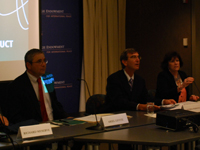Registration
You will receive an email confirming your registration.
The world's major vendor companies of civilian nuclear power plants have agreed to apply a common set of principles in their exporting decisions and practices. Facilitated by the Carnegie Endowment, these unprecedented "Principles of Conduct" establish clear voluntary guidelines for negotiating export contracts, designing facilities and engaging customer states. The Principles create common high standards of practice in the areas of safety, security, nonproliferation, environmental protection, ethics, and compensation for nuclear-related damages.
The Carnegie Endowment for International Peace launched this initiative in Washington via teleconference. Jessica T. Mathews, president of the Carnegie Endowment, introduced the event while Carnegie’s George Perkovich and Ariel Levite presented the initiative and facilitated a discussion. Nuclear experts from around the world explained the different aspects of the Principles. Representatives from the participating companies, as well as nuclear experts and members of the press attended.
A Need for this Initiative
- Ongoing enthusiasm for nuclear energy: Mathews explained that nuclear energy presently provides much of the world’s electricity and is widely expected to expand in light of increasing demands on states to reduce their dependence on fossil fuels. To realize the hoped-for benefits of nuclear energy, it will be important that all suppliers and potential customers apply high standards and practices.
- Few laws on civilian nuclear exports: There are few binding international laws and regulations regarding the export of nuclear technology other than those targeted at preventing proliferation, explained Mathews. Moreover, existing agreements only govern state behavior; they do not explicitly apply to private companies.
- Carnegie’s leadership: In 2008, the Carnegie Endowment began convening all global nuclear vendors to engage in a dialogue with world-respected nuclear experts. The goal of this discussion was to develop a common understanding of the parameters that exporters would voluntarily use to guide exports of nuclear power plants. For the past three years, representatives from eleven companies worked alongside industry experts and legal counsel to craft the text of the six Principles. Mathews noted that Carnegie’s global reach made this initiative possible, while Carnegie’s independence gave the companies confidence that this was not an attempt to undermine nuclear industries in other countries. Carnegie does not take a position for or against nuclear energy, but acts from the belief that if, when, and where nuclear energy is utilized, it should be done as safely and responsibly as possible.
About the Principles of Conduct
- A global common high standard: In developing and adopting the Principles, the world’s leading nuclear power plant vendors have articulated a set of principles that reaffirm and enhance national and international governance and oversight, said Perkovich. The Principles incorporate recommended best practices in the areas of safety, security, environmental protection and spent fuel management, nonproliferation, business ethics, and internationally recognized systems for compensation for nuclear-related damage.
- Corporate social responsibility: Nuclear power plant exporters recognize the value of identifying and aggregating universal standards and practices to uphold their reputations as socially responsible actors, Perkovich explained. The Principles of Conduct reflect the recent trend of establishing shared norms of corporate self-regulation to help manage global challenges.
- The vendors: All leading nuclear power plant vendors have adopted the Principles of Conduct. These vendors are AREVA, ATMEA, Atomstroyexport, Candu Energy (the successor company to Atomic Energy of Canada Limited’s export division), GE Hitachi Nuclear Energy, Hitachi-GE Nuclear Energy, Korea Electric Power Company, Mitsubishi Heavy Industries, Toshiba, and Westinghouse Electric Companies.
Global Expertise
Perkovich explained that the Principles were developed in close consultation with leading experts in nuclear energy. These include:
- Richard Meserve, former chairman of the U.S. Nuclear Regulatory Commission;
- Jukka Laaksonen, head of the Finnish Radiation and Nuclear Safety Authority (STUK);
- Frank Saunders, Vice President for Nuclear Oversight and Regulatory Affairs, Bruce Power;
- Jacques Bouchard, Chairman of the IAEA Standing Advisory Group on Nuclear Energy (SAGNE);
- Omer Brown, an expert on nuclear law and liability, and Nathalie Horbach, an independent nuclear law consultant at Dundee University;
- Pierre Goldschmidt, a former IAEA Deputy Director General for Safeguards; and
- Gare Smith, a partner at Foley Hoag LLP and a former State Department official.
Looking Forward
- Development of a review process: In December, the Carnegie Endowment and the vendors will meet in Moscow to finalize the parameters of a review process, Levite said. Through this planned review process, the companies will evaluate the implementation experience and its challenges, and refine the Principles as warranted. They will also engage emerging exporters and explore outreach to other nuclear industry stakeholders about the further development of the Principles.
- Transfer of responsibility to the vendors: Levite explained that the Carnegie Endowment will retain a modest supportive role, but the vendors will take over the day-to-day operation of the process after the December meeting.
- Reasons for optimism: Levite concluded that the development process was educational for both vendors and relevant stakeholders, and heightened the sensitivity of the pertinent companies to their social responsibility duties. Furthermore, although the Principles are not legally binding, the planned peer review process and the wide availability of the Principles will provide a mechanism for peer and public scrutiny. The Principles reflect the genuine aspiration of the participants to uphold best practices in their exporting decisions, and provide a roadmap for future vendors and customers seeking to enter the market.
